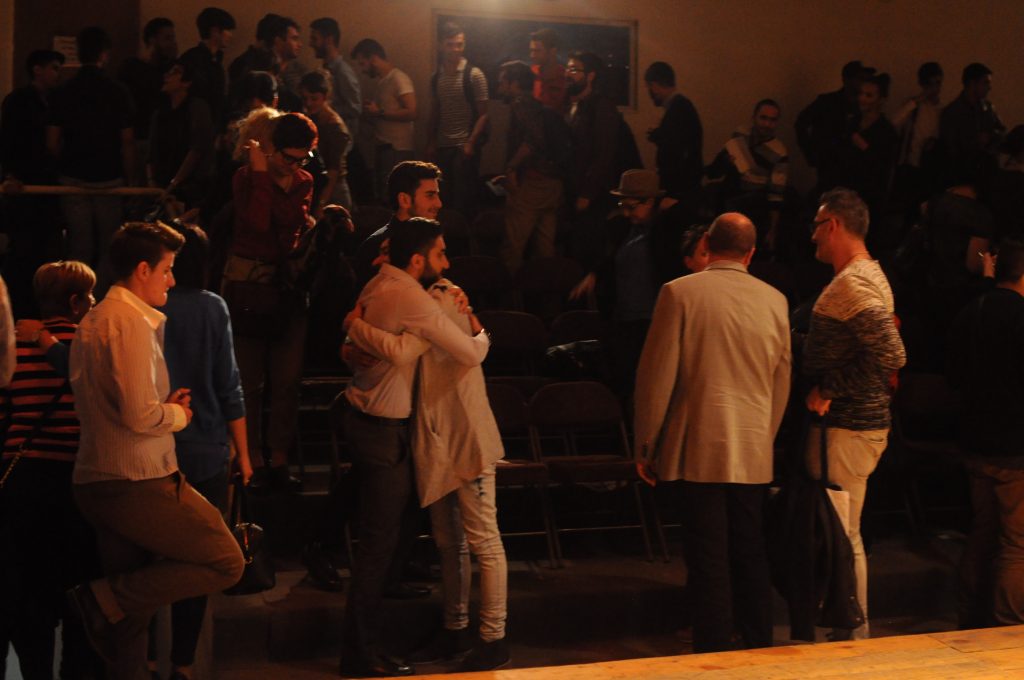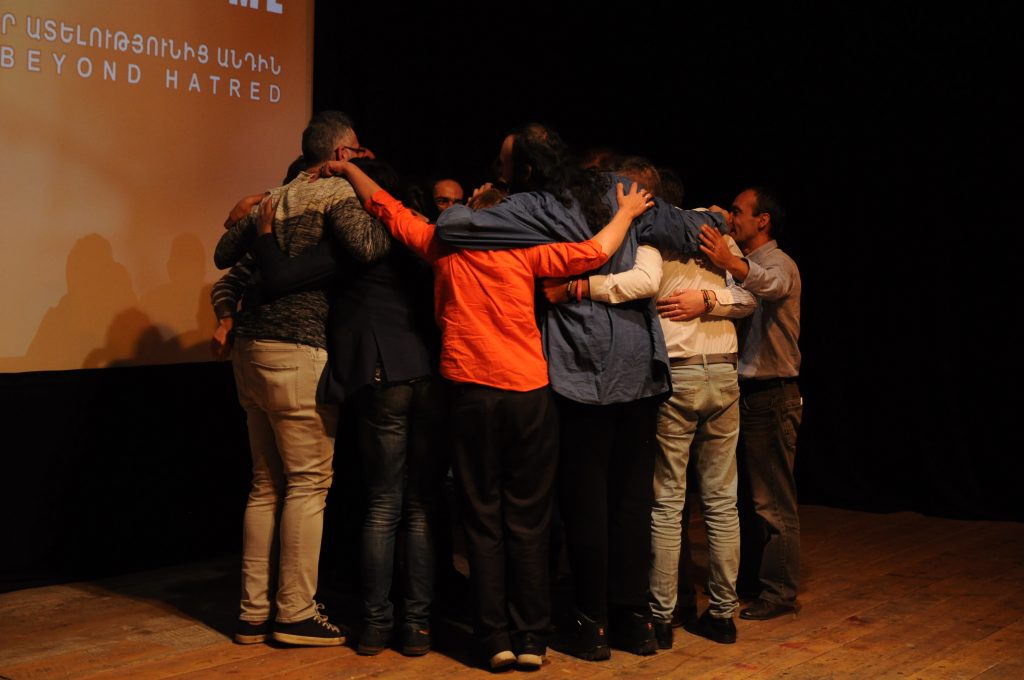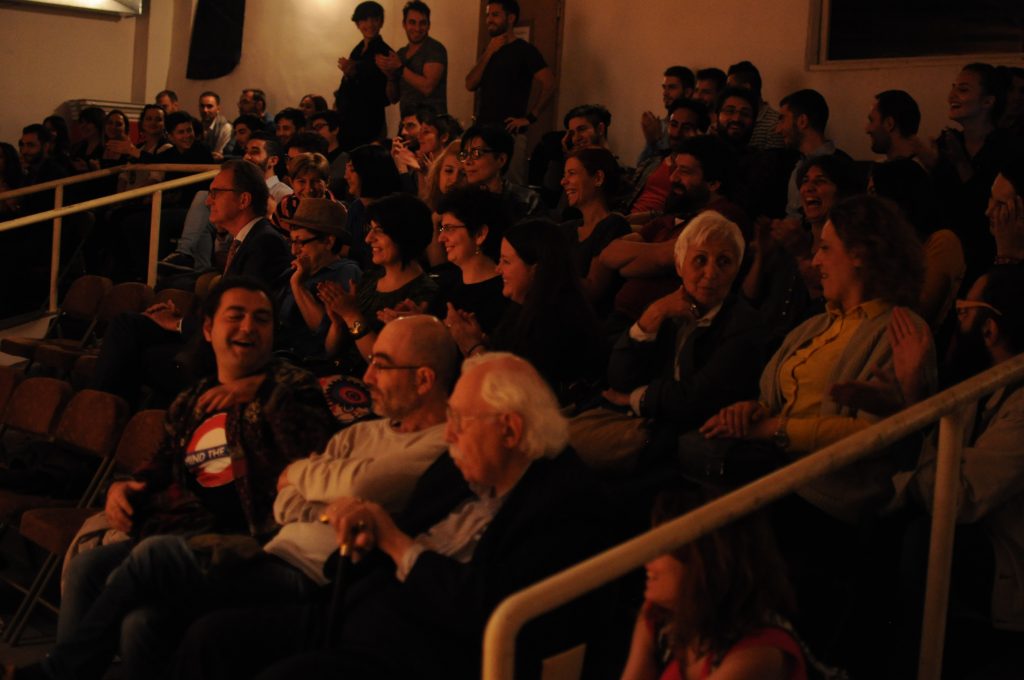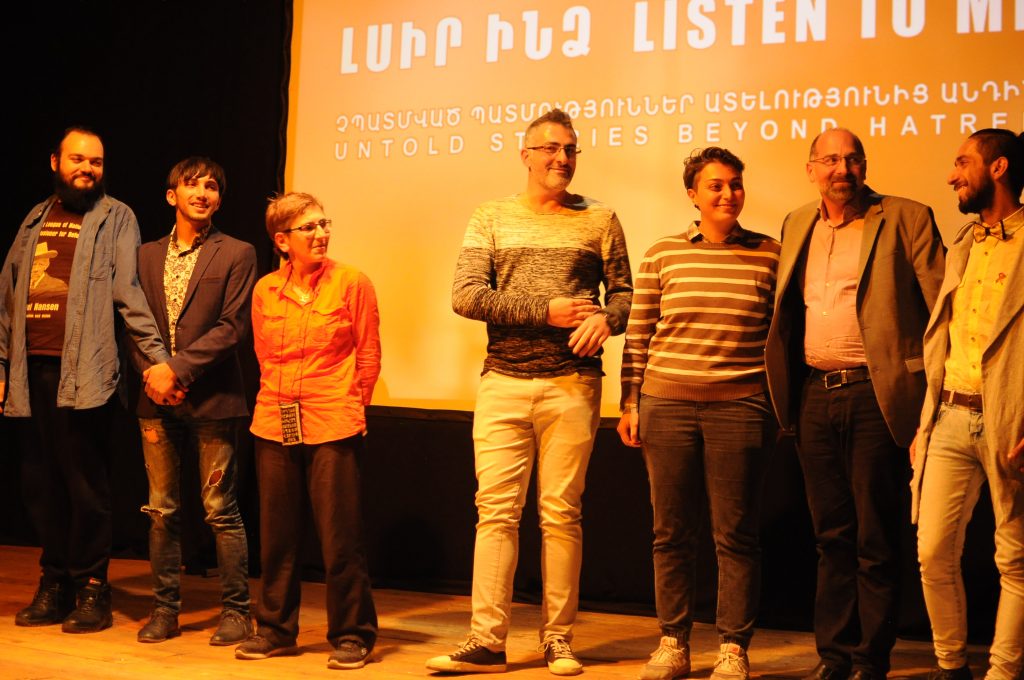Documentary Film ‘Listen To Me: Untold Stories Beyond Hatred’ Premieres in Yerevan
Special for the Armenian Weekly
The staff at PINK Armenia was abuzz on Oct. 11, as were the many young people who visit the organization’s Yerevan office each day. They come with appointments or for drop-ins to see one of PINK’s psychologists, lawyers, or the social worker; to meet, discuss, and organize in the community room; or simply to be themselves in perhaps the only space in the entire country where they are able to so.

The idea for the film was simple: to tell the stories of those, whose voices are not heard, and to change the image of LGBT people in Armenia. (Photo: Narek Aleksanyan)
Oct. 11 was the premiere of “Listen To Me: Untold Stories Beyond Hatred,” a documentary film produced by PINK Armenia with support from the United States Embassy in Yerevan, about the lives of ten LGBT (lesbian, gay, bisexual, transgender) people in Armenia. Directed by Gagik Ghazareh, the idea for the film was simple: to tell the stories of those, whose voices are not heard, and to change the image of LGBT people in Armenia.
Mamikon Hovsepyan, Executive Director of PINK and one of its founding members, said that it was time for Armenia’s LGBT community to come out of the closet before a packed audience at the Armenian Center for Contemporary and Experimental Art, which hosted the film’s first-ever screening.
“It is time for society to listen to LGBT people and to erase their hatred. It is time to break the silence and show that we exist, that we are your sisters, your sons, your students, your coworkers, your best professors, your closest neighbors, your famous weightlifters, your friends from the Diaspora, your favorite artists, or just another person sharing the same public transport as you,” Hovsepyan said, referring to the diverse cast of the documentary.
Outside the theater, a small exhibition of items belonging to each cast member with a description of the items’ significance gave the audience an opportunity to glance into their lives. They included a guitar, a world championship trophy for weightlifting, a Homenetmen scouting uniform, and a grandmother’s travel documents received in Syria after arriving by foot from Arabkir.
Not coincidentally, the film made its premiere on Coming Out Day, a day observed in the U.S. and internationally by queer activists, as a celebration of queer identity and coming out—the process of revealing one’s true sexuality and/or gender orientation and to live openly.
Armenia’s LGBT community “came out” suddenly in 2012 when Armine “Tsomak” Oganesova’s bar, DIY, was firebombed overnight by a group of ultranationalists. In the film, Oganesova says that she could have remained silent during the incident, but chose not to. “Because of this, it came out all at once. We began to understand that there is fascism in Armenia. [It was] always there, but after that incident [it] became much more visible,” she says in the film.
“Instead of accusing the boys, they accused me. I suffered the most. They said much more disgusting and demeaning things about me than those boys,” she added. Oganesova currently lives in Sweden, where she sought asylum after a relentless wave of threats against her and her family for speaking out about DIY’s bombing made it “impossible” for her to live in Armenia.
Local activists say that the incident was the turning point for the movement in Armenia, when LGBT people and their rights went from being unseen and unheard in the country, to subjects of public discussion—albeit a biased and very virulent one for LGBT people on the ground.
“Listen To Me” serves as a second coming out for the community, one rooted not in violence and coercion, but in the freedom to choose one’s coming out, and to live freely and with dignity. It also puts a face to LGBT people in Armenia, where homosexuality is often thought of as a foreign phenomenon not native to the Armenian people. According to the first national survey study on societal attitudes towards LGBT people conducted by PINK and the Women’s Initiatives Supportive Group (Georgia), only 9% of Armenians said they knew an LGBT person. Those that did specified knowing one to two gay men only.
The study found what activists have known for years—that a very limited understanding of sexual orientation and gender identity is widespread in Armenia. Negative attitudes are deeply rooted, and unlike in other countries, age and gender are not determining factors for the level of acceptance of homosexuality, as 86.6% of survey respondents “strongly agree” that homosexuality should be outlawed.
PINK Armenia invited several government representatives and ministries to attend the film’s premiere, including the Ministries of Justice, Health, Education and Science, Sport and Youth Affairs, Culture, Foreign Affairs, and the Human Rights Defender’s Office. However, no government representatives responded to PINK’s invitation or attended the film’s premiere, which comes as no surprise.
The official line of Armenian authorities regarding the rights of sexual minorities for years has been either that there are no issues in regards to the rights of LGBT people in the country, or outright public expressions of homophobia and transphobia from top ranking officials. A recent discussion in the National Assembly on NGO law devolved into a petty contest of which member could be more homophobic.
In 2015, the Human Rights Defender’s Office received just two applications regarding rights violations on the basis of sexual orientation and/or gender identity. PINK Armenia received 46, reflecting the local community’s deep mistrust of authorities and the fear of disclosing one’s sexual orientation and/or gender identity, even when it involves rights violations.
Most cases of violence and discrimination go unreported, and Armenia lacks comprehensive legislation protecting citizens from discrimination on the basis of sexuality and/or gender identity. The inaction of law enforcement bodies, their failure to prevent crimes, as well as the court’s failure to restore social justice and prevent further offenses by bringing offenders to justice all contribute to an overall culture of impunity. 2015 was also marked by the banning of same-sex marriage in Armenia by an amended article on marriage of the new constitution, which oppositionists say was used as a scapegoat to draw attention away from other critical issues.
Though life in Armenia for LGBT people is far from what activists want (according to ILGA Europe, Armenia is the third worst country in Europe for LGBT people, after Azerbaijan and Russia), the faces seen and stories told in “Listen To Me,” remind the viewer that Armenia cannot be exceptionalized as an inherently homophobic place. Listening to LGBT Armenians breaks the mold in more ways than one about Armenia and queerness. They are stories of pain and struggle, but also of harmony and love.
“When we first set out with the vision of changing the LGBT situation in Armenia, and to empower the community nine years ago, we could not have imagined that we would have such a strong community like the one we have today,” said Hovsepyan.

‘The film’s strength lies in its cast. The ten individuals who share their stories in ‘Listen To Me’ are a true reflection of the local LGBT community.’ (Photo: Narek Aleksanyan)
The film’s strength lies in its cast. The ten individuals who share their stories in “Listen To Me” are a true reflection of the local LGBT community. The film features three diasporan Armenians who now live in Armenia. It includes trans and bisexual stories. There is a gender balance and broad representation of age in the film. The diversity of the storytellers and their experiences stand defiantly against the stereotypes and myths that surround public understanding of LGBT people in Armenia.
Director Gagik Ghazareh said that one of the goals of the film was to capture the stories of its cast without altering what they had to say when they said it in front of the camera. “We did not want to portray messages that were decided or planned previously. We wanted this to be honest and real, and we achieved that. It was an honor to work on this film with PINK and with these courageous individuals,” said Ghazareh during the premiere.
With “Listen To Me,” Karine, Romik, Tsomak, Sevak, Mel, Vahan, Gayane, Armen, Karabina, and Elvira shatter the collective silence that surrounds the topic of LGBT people in Armenia, and challenge us all to come out for sensitive and meaningful discussion on love, identity, and human rights in Armenia and for LGBT people everywhere.
“Listen To Me” has already been screened in Nicosia, with more screenings in Yerevan, Tbilisi, Stockholm, and in diaspora communities planned for the future.
Source: Armenian Weekly
Link: Listening to LGBT People in Armenia


